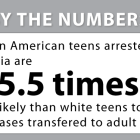DMC and DSO are Priorities for GA
|
Disproportionate minority contact and detention of status offenders are the core issues for Georgia’s juvenile justice system, according to Joseph Vignati, Justice Programs Coordinator at the Governor’s Office for Children and Families. Vignati will testify at a hearing on reauthorization of the Juvenile Justice and Delinquency Prevention Act in Washington D.C. this week. He speaks with a loud voice, because he’s also the National Juvenile Justice Specialist for the Coalition for Juvenile Justice, representing 56 states and territories. Vignati says the JJDP Act requires states to focus on four core issues:
Removing juvenile offenders from adult jails
Separating juveniles from adults if they are held in the same lockup
Disproportionate minority contact
Minimizing the detention of status offenders
He believes the first two issues are less significant now than they were 20 years ago, because Georgia and other states have laws against housing children with adults, and separate detention centers for kids. Vignati points out, “In FY 2009 we had only 23 juveniles locked up as adults across the state, and 20 of them lied about their age.
